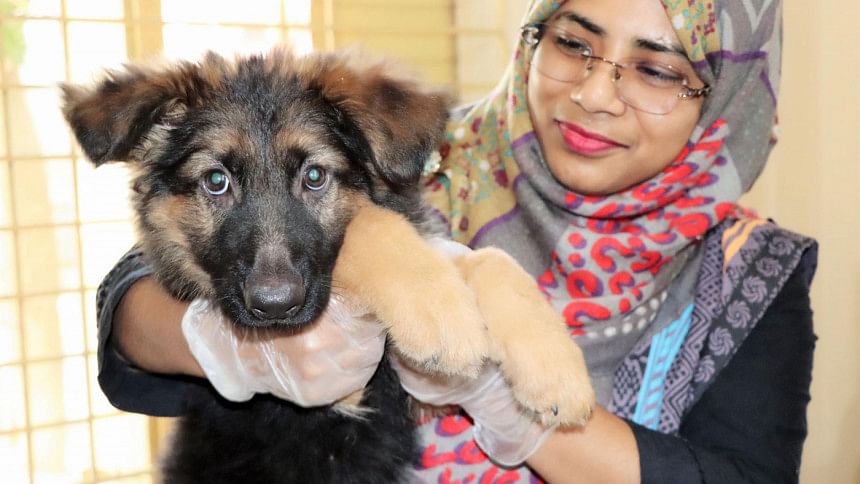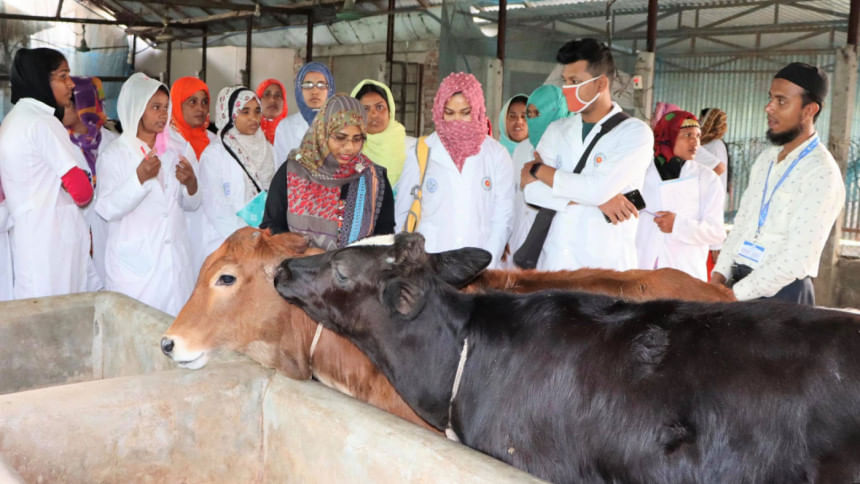Dr Salma Sultana bags the 2020 Norman Borlaug Award for Field Research and Application

Veterinarian Dr Salma Sultana was honoured with the 2020 Norman Borlaug Award for Field Research and Application from World Food Prize Foundation (WFPF). The ceremony was held virtually on October 13, 2020.
The Norman Borlaug Award recognises exceptional, science-based achievement in international agriculture and food production by an individual under the age of 40. As a young scientist, Dr Norman Borlaug worked in Mexico in the 1940's and 50's. WFPF honours an individual who emulates the same intellectual courage, stamina and determination in the fight to eliminate global hunger and poverty.
"As we work on hunger and poverty alleviation, my colleague and I were looking at websites to see which organisations actually work on these matters. We came to know that Dr Yunus and Dr Fazle Abed are World Food Prize laureates from WFPF's official website," shares Dr Salma.
"There are two award categories – World Food Prize and Dr Norman E Borlaug Award for Field Research and Application. I was well suited to apply for the under forty categories, and had submitted my nomination in 2018," she adds.

Very recently, Dr Salma received an email from the authorities, inquiring about her work. "They had even used international organisations to verify my activities," she shares.
She had no idea about her selection for the award before August 31, 2020. On that day, after her interview with WFPF, she came to know about her selection.
As a female veterinarian and a single woman in her thirties, Salma had her share of struggles. Even her family, who supported her and had faith in her ideas, had to face many stereotypical questions.
Dr Salma's mother and brother were over the moon when they found out that she was selected for the award. "When I explained to my mother that this award is like the Nobel Prize for Food and Agriculture, she could not contain her happiness. We even did a little dance together!" smiles the doctor.
Her project supervisor, who currently resides in the USA, and her mentor, Dr Nitish C Debnath, were also very pleased to know about her accomplishment.
Dr Salma founded the NGO, Model Livestock Advancement Foundation (MLAF), in 2015. The organisation focuses on vocational training, animal healthcare, awareness, creating employment, and empowering women, among other agendas. For her work, she was honoured with the Joy Bangla Youth Award (2017) from Young Bangla.
During the Covid-19 pandemic, she started two major projects for food safety and food security. She provided animal-feed supplements to farmers. On the other hand, her online service Safe and Green Bazar, offers safe and healthy animal products like chicken, duck, eggs, milk and beef. In these difficult times, her approaches were profitable for both the customers and the producers.
The food from Safe and Green Bazar is lab tested and certified to be safe in all regards. Thus, her approaches to fight against degrading food nutrition aligned with the WFPF.
"I was worried about the risk of zoonosis, a process that involves the transfusion of harmful substances from an animal to a human, in this pandemic," she mentions. "Digesting the meat of a sick animal or an overdosed medicine can cause harmful chemical reactions in the body."
She also took an initiative to feed stray animals on the streets, on her own, during this time. "I tried to ensure proper nutrition for the voiceless during the pandemic," she says. "After a while, I received support from both the authorities and my peers, who worked with me as volunteers. They also donated from their savings for this cause."
Dr Salma also conducted an extensive study on livestock development, food and nutrition. "Most people in Bangladesh have misconceptions about organic food," she says. "The term 'organic' has become a sales pitch."
Dr Salma reveals that the production of organic food must not involve any sort of artificiality, such as chemical pesticides or fertilizers. "Even the water the domestic animals drink has to be treated," she adds.
Safe and Green Bazar has trained employees to ensure food safety. Dr Salma also plans to train farmers to produce organic food. "I am hopeful that we can achieve it in Bangladesh in a cost-effective way," she adds.
Her last few projects have been planned to maximise female empowerment and participation, especially in the rural regions. "To raise a voice, you must first be self-sufficient," she claims.
By providing vocational training and other services, she intends to equip women with knowledge on farming techniques and food nutrition.
Dr Salma plans to ensure equal nutrition, irrespective of gender or social class, for everyone in the society. "Fast food and unbalanced diet are the prime reasons behind our physical unfitness," she shares. "I want to ensure that people are receiving proper nutrition."

 For all latest news, follow The Daily Star's Google News channel.
For all latest news, follow The Daily Star's Google News channel. 



Comments